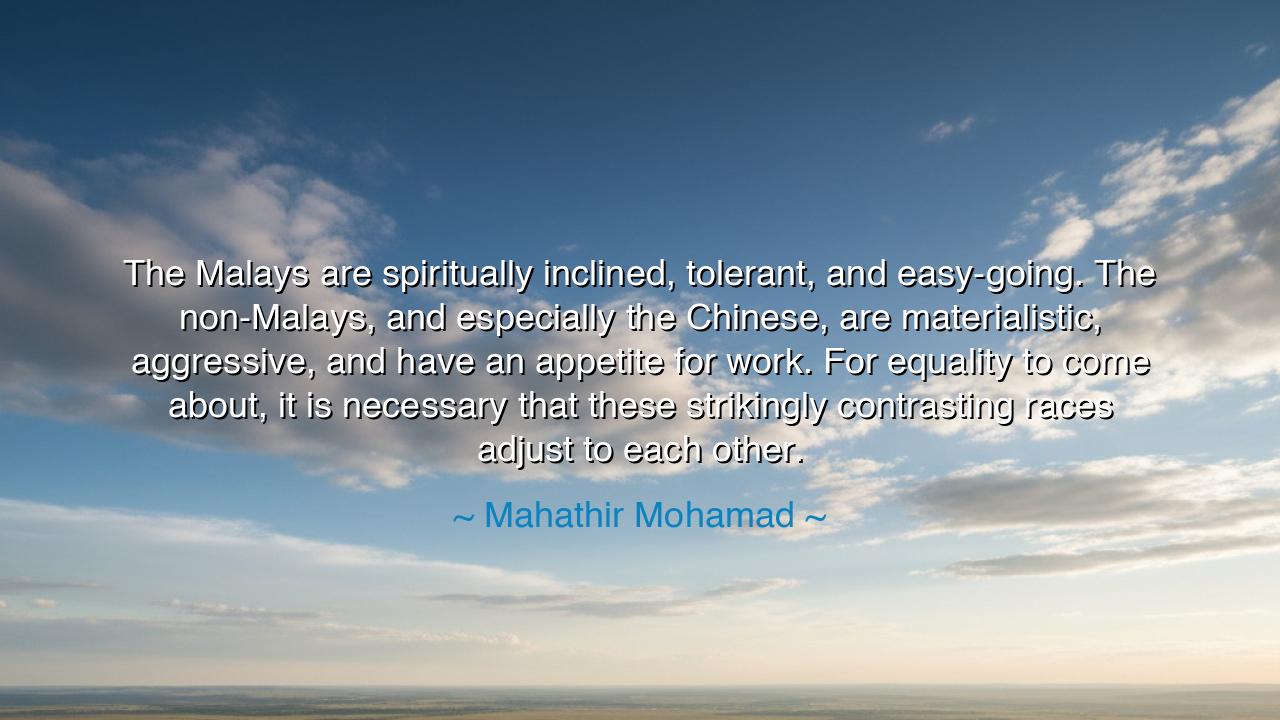
The Malays are spiritually inclined, tolerant, and easy-going.
The Malays are spiritually inclined, tolerant, and easy-going. The non-Malays, and especially the Chinese, are materialistic, aggressive, and have an appetite for work. For equality to come about, it is necessary that these strikingly contrasting races adjust to each other.






"The Malays are spiritually inclined, tolerant, and easy-going. The non-Malays, and especially the Chinese, are materialistic, aggressive, and have an appetite for work. For equality to come about, it is necessary that these strikingly contrasting races adjust to each other." These words from Mahathir Mohamad reflect a deep-seated observation about the nature of cultural differences and the necessity for understanding and adjustment between them. The wisdom embedded in this statement speaks to the challenges of harmony in a multicultural society, where the diverse characteristics of different peoples must be acknowledged and respected if equality is to be achieved. In order for true equality to flourish, it is not enough to simply demand it—it must be actively fostered through mutual respect and adaptation.
In the ancient world, unity between different peoples and cultures was often seen as the highest achievement of any great empire. The Romans, for example, understood the importance of cultural integration. While they conquered vast territories, they also assimilated diverse cultures into the fabric of their empire. They did not demand that conquered peoples abandon their identity or values; instead, they recognized that peace and prosperity could only come about through a synthesis of differences. The Roman peace (Pax Romana) was not just political stability; it was a recognition that different cultures could co-exist and thrive together under a common rule. In this way, the wisdom of the Romans echoes Mahathir Mohamad’s vision: that for harmony to exist, those with contrasting natures must learn to adjust and understand one another.
Mahathir Mohamad’s insight into the Malays and the Chinese offers a glimpse into the struggles that many multicultural societies face: the tendency to stereotype or divide based on perceived differences. The Malays, described as spiritually inclined, tolerant, and easy-going, are often seen as less materialistic in comparison to the Chinese, who are depicted as industrious, aggressive, and driven by an appetite for work. These differences are striking, but Mohamad’s wisdom lies in his recognition that these very contrasts must not divide, but rather, become the foundation for a balanced society. To achieve equality, both sides must come to an understanding, and be willing to compromise, to adapt, and to embrace the value that each culture brings to the table.
Consider the American Civil Rights Movement, where the African American struggle for equality faced stark cultural and societal contrasts. Martin Luther King Jr., a leader of this movement, understood the importance of building bridges between different races and cultures. His advocacy for nonviolent protest was not only a call for political and legal change, but a call for societal reconciliation—to unite black and white Americans in the fight for justice. King’s vision was not simply for equality in the abstract, but for a practical, lived equality that required mutual respect, understanding, and the willingness of both sides to adjust their perspectives and actions. Like Mohamad’s words, King’s message emphasized that true equality is a process of learning to live together despite differences.
The difficulty, however, lies in the deep entrenchment of cultural identities and stereotypes that often make such adjustment feel like a daunting task. The Malays and the Chinese, as Mohamad describes, embody contrasting values, which can sometimes lead to misunderstanding or even hostility. However, these contrasts do not need to lead to division. In fact, when approached with wisdom and openness, they can be the source of a dynamic society that celebrates the best of both worlds. India, a land of deep cultural, linguistic, and religious differences, provides a poignant example. Despite its diversity, India has managed to remain united through the values of tolerance and respect for diversity. The Indian constitution was designed to promote unity in diversity, encouraging different groups to work together while preserving their unique identities.
Mahathir Mohamad’s message is a call to recognize that equality is not a single path, but a journey—one that requires understanding the inherent differences between people and cultures, and then using those differences to build a stronger, more inclusive society. For those who would see the differences between the Malays and the Chinese (or any other contrasting cultures) as insurmountable, his message is clear: adjustment and compromise are not weaknesses, but the keys to progress. It is only through mutual respect that true equality can be achieved, for without understanding the complexities of different cultures, there can be no genuine unity.
The lesson, then, is this: for equality to thrive, we must be willing to recognize the differences that exist between us, and yet, see them as opportunities for growth and learning, not as obstacles. Mahathir Mohamad teaches us that adjustment and adaptation are the hallmarks of a society that is not only just, but also resilient and prosperous. Just as ancient civilizations blended diverse cultures to create powerful empires, so too must modern societies blend diverse perspectives to create a world that values equality and justice for all.
So, future generations, take heed of this wisdom. In the face of differences, do not seek to divide, but to unite. Recognize that equality is not about erasing cultural distinctions but about celebrating the beauty and strength that each individual and culture brings to the whole. Like the Malays and the Chinese, who must adjust to one another for true harmony, so too must we adjust our own minds and hearts to embrace the rich diversity of the world around us. Let us walk forward in mutual respect, building a future where equality is not merely a dream, but a reality.






AAdministratorAdministrator
Welcome, honored guests. Please leave a comment, we will respond soon